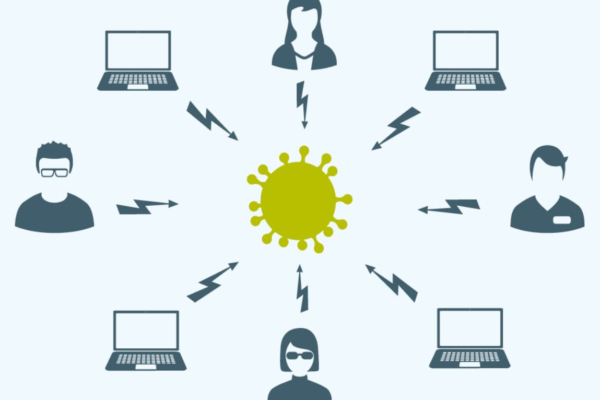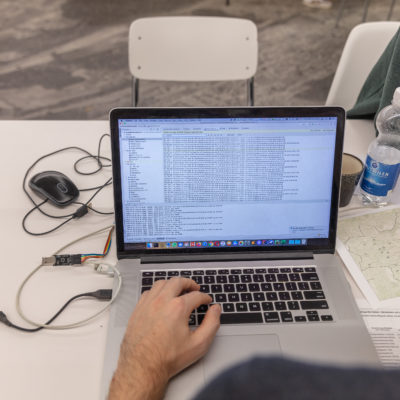
HSLU students work on solutions for the corona crisis
Approximately 180 young men and women in the Applied Information & Data Science programme at Lucerne University of Applied Sciences and Arts are working with researchers and data scientists around the world to devise viable solutions for the COVID-19 crisis. For this, they have joined #CodeVsCovid19, a network launched by HackZurich with the support of The Federal Department of Home Affairs (FDHA).
The corona crisis makes it essential for everyone in society to show solidarity and become creative. Professionals in the data and computer sciences are therefore in particular demand at the moment because of the urgent need to develop new approaches to tackling the situation brought on by COVID-19. Around 180 students of the interdisciplinary Master’s programme in Applied Information & Data Science at Lucerne University of Applied Sciences and Arts have therefore joined the #CodeVsCovid19 network.
This network was launched by HackZurich with the support of the Federal Department of Home Affairs (FDHA) and taps into the collective intelligence of both established and novice researchers, developers, and technology experts from around the world. From 27 to 30 March 2020 they will jointly develop hundreds of prototypes of apps and computer programmes and work on straightforward solutions that are urgently needed to combat the health, social and economic consequences of the COVID-19 crisis. These solutions include not only new methods for detecting infections and addressing problems in logistics and e-learning but also applications to help people stay in touch while social distancing.
Hacking against the coronavirus instead of taking exams
To contribute significantly to the success of the event, Lucerne University of Applied Sciences and Arts is calling on everyone in the Master’s programme in Applied Information & Data Science to take action. “We train our students to harness the economic and social potential of the data we have, and they know all about applying cutting-edge technologies and analytical tools to process large data volumes for a specific purpose.” says Andreas Brandenberg, the head of the programme. He believes that his students are uniquely qualified when it comes to exploring options for coping with the corona crisis.
For example, one project group will apply a method for analysing social networks and use it to simulate how the virus spreads in society. This would make it possible to predict when and where cases of the disease are more likely to occur and to take measures at an early stage. Working on such projects requires a high level of commitment from everyone involved. Andreas Brandenberg adds that “we are making sure that our students can concentrate fully on their project. The university also awards college credit to those who join the hackathon, and any exams and deadlines that are affected by it will be rescheduled.”
Update
Our students tested their mettle during the CodevsCovid19 hackathon, at the end of which the best 25 out of 306 projects were chosen in a public vote. They worked not only on the winning project, but also on four other ones in the top 25. And the project of two lecturers was also in the “top 25” category. There was a wide range of challenges and problems to be solved:
- Detect Now: The winning project features an algorithm that relies solely on coughing sounds to identify whether a person is infected with the coronavirus. This makes it easy to test anyone at home by using a computer.
- Next Step – Get Back Together: This app can help to break the chain of infection because it recognizes when two anonymized persons have been standing close to each other for a longer period. If a user has become infected with the virus, he or she can report this anonymously via the app. All persons who may have had been in contact with him or her are then informed that they may be at risk, and they can then immediately go into self-isolation.
- Sero Data – Zero Cases: This website collects data on all antibody tests. Once these tests are available to the general population, the website provides excellent data on how the virus spreads.
- Automatic Detection of Covid19 from POCUS Ultrasound Data: This team developed a model that uses ultrasound images of the lungs to detect a coronavirus infection. It is a very cost-effective test method that can be used in every doctor’s office.
- Be a Sheep: Similar to Next Step, this app detects when two users have crossed paths. As soon as one of them tests positive for the coronavirus, all those who may have had contact with this person are informed. The app also features a newsfeed and questionnaire for users to evaluate symptoms themselves.
- Spread Modelling: Forecasting with a Unified Database: This software compiles data on Covid19 cases from different countries and sources in order to improve the underlying data structure. It also allows such data to be used for making forecast and visualizations.
Although the winning project won a CHF 1,000 prize directly, the remaining 24 projects can also apply for such funding. Some projects, for example “Be a Sheep” or “Match4care“, are already in contact with companies and investors interested in further developing the prototype.
Start your career with the MSc in Applied Information and Data Science now!
Register and join us for a free online Info-Event:
Monday, 9 March 2026 (Online, English)
Monday, 13 April 2026 (Online, German)
Monday, 11 May 2026 (Online, English)
Monday, 8 June 2026 (Online, German)
MORE INFORMATION TO THE MASTER’S PROGRAMME HERE:
MORE FIELD REPORTS & EXPERIENCES: Professional portraits & study insights
PROGRAMME INFO: MSc in Applied Information and Data Science
DOWNLOAD BROCHURE: MSc in Applied Information and Data Science Brochure
CHECK OUT OUR: Generalist profile
FREQUENTLY ASKED QUESTIONS: FAQ





